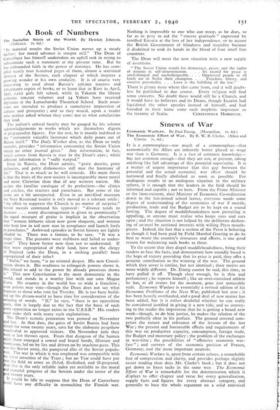A Book of Numbers
The Socialist Sixth ot the World. By Hewlett Johnson. tGollancz. 7s. 6d-)
4- IN material results the Soviet Union moves up a steady incline: her moral advance is steeper still." The Dean of Canterbury has himself undertaken an uphill task in trying to substantiate such a statement at the present time. But he has unbounded faith in the power of statistics. He has com- piled nearly four hundred pages of them, almost a statistical abstract of the Soviets, each chapter of which inspires a growing wonder at his own credulity. It is of course very interesting to read about Russia's 558,600 tractors and 571,000,000 copies of books, or to learn that in Kiev in April, 1937, 1,112 girls left school, while in Yakutsk the library contains 200,000 volumes and 24 Yakuts have received dip:omas at the Lunacharsky Theatrical School. Such asser- tions are intended to produce a cumulative impression of culture and prosperity ; and so they would, upon a reader who neither asked whence they come nor to what conclusions they lead.
The author's critical faculty may be gauged by his solemn acknowledgements to works which are themselves digests of propagandist figures. For the rest, he is mainly indebted to the "extremely valuable literature which daily pours out of Russia itself." The Daily Worker also, as the Dean so truly remarks, provides "information concerning the Soviet Union which no other journal gives." Any information, in fact, which comes from Russia is true in the Dean's eyes ; while different information is "sadly warped."
Even in Russia, the Dean admits, "petty deceits, petty jealousies, and petty dishonesties still mar the harmony of life." That is as much as he will concede. His main thesis is that the basis of the new society is incomparably more moral and more Christian than that of any western nation. He recites the familiar catalogue of its perfections—the clinics and creches, the tractors and parachutes. But some of the items are a bit unexpected. Even in an anti-God museum the Very Reverend tourist is only moved to a tolerant smile : "the effort to suppress the Church is no matter of surprise." Soviet morals command his approval: "divorce tends to decrease . . . every discouragement is given to promiscuity." An equal measure of praise is implicit in the observation that "women hitherto silent now grow eloquent, and women who bent low in toil now soar in aeroplanes and launch forth in parachutes." Awkward episodes in Soviet history are lightly alluded to. There was a famine, to be sure. "It was a tragic time. The peasants were stubborn and failed to under- stand." They know better now than not to understand. If they were expropriated of their land, have not the clergy of England (asks the Dean, in a striking parallel) been expropriated of their tithe?
"Stalin," we learn, "is no oriental despot. His new Consti- tution shows it. His readiness to relinquish powers shows it. His refusal to add to the power he already possesses shows it." This new Constitution is the most democratic in the world, and stands in a worthy line with our own Magna Carta. No country in the world has so wide a franchise ; ven priests may vote—though the Dean does not say what
ppens to those who vote for Trotsky. He is too busy build- ng up his dream-world to have time for consideration of the
caning of words. "If," he says, "there is no opposition arty, that is largely due to the fact that the basis of such any opposition no longer exists in the U.S.S.R." His readers ust make shift with many such explanations. The Dean's ecstatic peroration was penned on November
d last. At that date, the gates of Soviet Russia had been losed for some twenty years, save for the elaborate peepshow ouchsafed to approved visitors. On November 30th they ere at last thrown open. From that dungeon of the human Pint there emerged a cowed and brutal horde, illiterate and erminous, led on by lies and driven on by machine-guns. This as the Soviet army, the pampered elite of the Soviet popula- on.. The war in which it was employed was comparable with
e vilest atrocities of the Tsars ; but no Tsar could have put o the field an army so ill-fed, ill-clothed, and ill-prepared. nd this is the only reliable index yet available to the moral d material progress of the Soviets under the terror of the St twenty years.
It would be idle to suppose that the Dean of Canterbury uld have any difficulty in stomaching the Finnish war.
Nothing is impossible to one who can stoop, as he does, so far as to pray in aid the "sincere gratitude" expressed by terrified Estonia at the loss of her independence, or to accuse the British Government of blindness and stupidity because it disdained to soak its hands in the blood of four small free countries.
The Dean will meet the new situation with a new supply of assertions.
"The Soviet Union stands for democracy, peace, and the rights of nations to self-determination. . . . Its record for peace is unchallenged and unchallengeable. . . . Oppressed people in all lands see in Stalin their champion. . . . Freedom, liberty, and creative personality. . . . Love is the fulfilling of the law."
There is plenty more where this came from, and it will doubt- less be published in due course. Every religion will find some converts. No doubt there would still be a Church, and
it would have its believers and its Deans, though Iscariot had liquidated the other apostles instead of himself, and had founded in their name some such mephitic imposture as






































 Previous page
Previous page